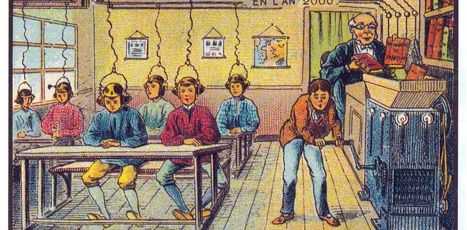The annual NMC Higher Education Horizon Report is a recognized resource that explores emergent areas likely to have an impact on learning, teaching, a
Research and publish the best content.
Get Started for FREE
Sign up with Facebook Sign up with X
I don't have a Facebook or a X account
Already have an account: Login
Issues and priorities arising around academic development, teaching and learning in Higher Education.
Curated by
Learning Futures
 Your new post is loading... Your new post is loading...
 Your new post is loading... Your new post is loading...
|
Vanessa Ong Li Wen's curator insight,
June 26, 2017 2:56 AM
This author’s rather sceptical view of personalised learning was made apparent to me in the title, in which she gave inverted comma to the term “personalised learning”. It was also this fact that triggered my interest in this article, encouraging me to click the button to read its contents. Mark Zuckerberg, together with his wife, has created a trust fund initiative to invest in personalised education. He has a clear definition in mind, defining personalised learning as “working with students to customise instruction to meet the student’s individual needs and interests”. While reading the article, I admired Zuckerberg’s initiative to invest in personalised learning and propel our progress in education. However, the author pointed out the 3 major flaws in his definition of personalised learning. Firstly, by feeding children content they are only interested in, society may end up producing workers who are specialists but not generalists. In addition, children’s lack of ability to compensate for adapting themselves to new methods of learning may actually be a hindrance when they enter working life. Finally, children are reactive and their preferences may change – this may end up creating an environment that takes away the valuable social contract between teachers, parents and children that is inherent to effective learning. While I commend Mark Zuckerberg in recognising the advantages of personalised learning – increasing students’ sense of ownership and relevance, as well as sparking their interests towards learning – there are still many issues that need to be addressed before personalised learning can become a reality. His vision of personalised learning, though motivated by the sincerity to improve the lives of our young, is underpinned by a lack of evidence and is ambiguous at best. Ensuring that personalised learning holds promise for our young and that it becomes more of an advantage rather than a hindrance, requires the development of strategies to marry the relationship between teachers and students in education. This is something that takes time, connection and collaboration, and definitely cannot be hurried by simply pouring in resources whilst giving a vague rationale that doing so creates a better tomorrow – even if your name is Mark Zuckerberg.
|











